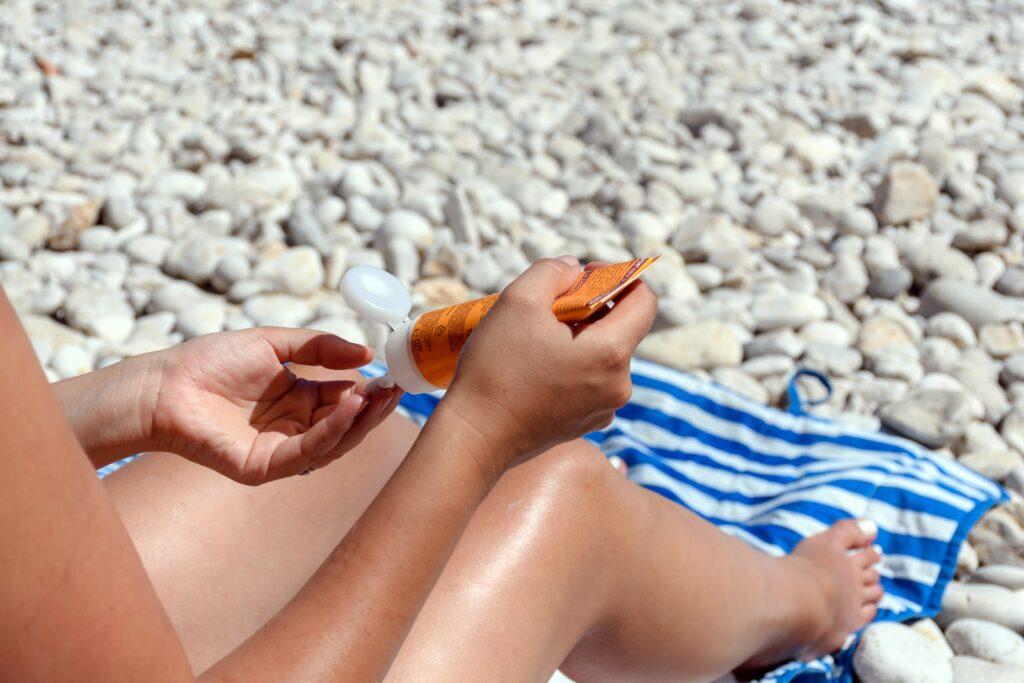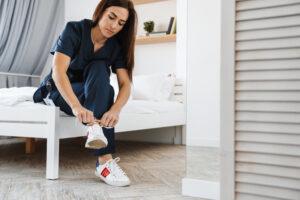July is the hottest month of the year for most US cities, so it makes sense that UV Safety Awareness Month would coincide with it. Skin health is pretty important, but we don’t often think about it as much as other aspects of our general health. In order to keep our providers as safe as possible, we wanted to share a few UV safety tips to improve your skin health and keep yourself protected from harmful rays.
Our Jogan Health nurses working in sunny new cities have ample opportunities to enjoy the great outdoors. If you are one of these nurses enjoying the sun, read our UV safety tips to protect yourself from harmful rays.
UV Safety Tips to Prevent and Mitigate Sun Damage
Wear Sunscreen
We don’t just mean when you go to the beach! During your time between shifts, or whenever you are headed outside for a long period of time, make sure to use a broad-spectrum sunscreen with an SPF of 30 or higher.

Apply it to every exposed area of your skin and — this part is key — wait at least 15 minutes after applying it before going outside. Make sure to reapply every two hours. You might even need to use it more frequently if you are sweating or swimming, as it can wash off over time.
? Learn from an expert. Dendy Engelman, M.D, explains how to apply sunscreen correctly.
Stay in the Shade
Peak sunlight hours might vary depending on where you’ve been placed. A good rule of thumb is to assume that the sun is at its strongest between 10 a.m. and 4 p.m. Even if you don’t feel like the heat is that bad, harmful levels of UV rays might be present. Taking a break in the shade for a few minutes is one of the best ways to reduce your exposure.
Consider Protective Clothing
Wearing protective clothing like long-sleeved shirts might make you feel hot in the intense heat — especially after a long day in scrubs! However, the risk of conditions like skin cancer is well worth mitigating in any way possible.
Consider wearing long, breathable pants and wide-brimmed hats to minimize direct sun exposure. It’s also a good idea to ensure the clothes you are wearing — even if they don’t fully cover your skin — have a UPF rating for added sun protection.
Wear the Right Sunglasses
Skin isn’t the only part of you that’s at risk when exposed to UV rays. Your eyes can also sustain significant damage if left unprotected. Try to wear sunglasses that provide 100% UV protection and block both UVA and UVB rays.
Try to Avoid Reflective Surfaces
Remember that surfaces like sand, water, and snow can reflect the sun’s rays, increasing your exposure. Take extra precautions in these environments.
Research Your Area’s UV Index
Check the UV index for your area before making plans after your shift. This index can inform you of the intensity of UV radiation in your area, which can be especially helpful in a new city where you don’t know the average amount of sunlight.
?️ UVA rays VS. UVB rays. Learn more about the differences in UV radiation with Healthline.
Drink Plenty of Water
At Jogan Health, we are big fans of water. Though it is common knowledge that water is healthy for your overall health, did you know that drinking plenty of it can also keep your skin hydrated and healthy? If you have a hard time remembering to drink water, check out the HidrateSparkPRO smart water bottle, which reminds you to meet your hydration goals through glow reminders and app compatibility.
☀️Nine myths about sun safety. Continue learning about sun safety with City of Hope Cancer Treatment & Research Center.
Jogan Cares About Your Health
We want our providers to stay healthy, so they can enjoy their stay in new locations and continue to help patients. We care for you, so you can care for them! If you are a nursethat is looking for placement, contact us today to find the perfect home for your skills. If you are already a part of the Jogan Health team, keep checking our blog for more lifestyle and health tips that are sure to benefit your experience as a healthcare provider.




